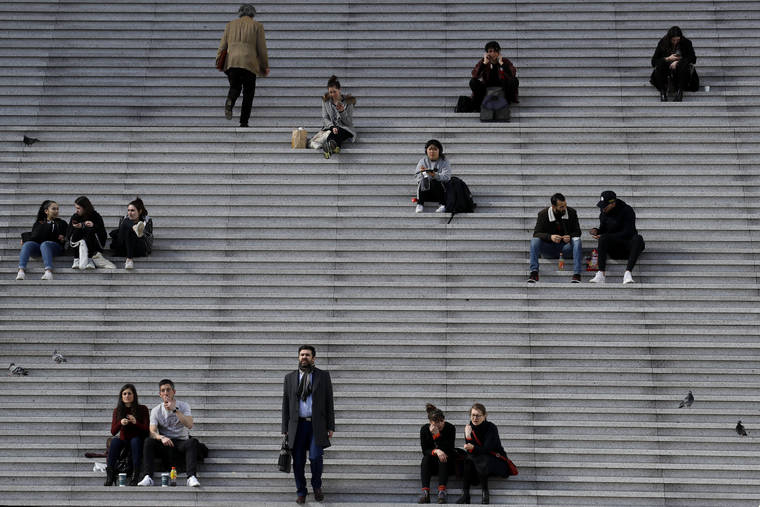BRUSSELS — European Union leaders on Thursday lashed out at President Donald Trump’s decision to restrict travel from Europe to the United States because of the new coronavirus, calling the the pandemic a global crisis that “requires cooperation rather than unilateral action.”
Trump, who had called COVID-19 a “foreign virus” and claimed that European travelers “seeded” infection clusters in the United States, said late Wednesday that all European travel would be cut off.
U.S. officials later said the entry ban only would apply to most foreign citizens who have been inside Europe’s passport-free travel zone during the 14 days prior to their arrival in the United States.
“The European Union disapproves of the fact that the U.S. decision to impose a travel ban was taken unilaterally and without consultation,” European Council President Charles Michel and European Commission President Ursula von der Leyen said in a joint statement.
“The coronavirus is a global crisis, not limited to any continent, and it requires cooperation rather than unilateral action,” the two said.
Europe’s passport and visa-free Schengen travel area comprises 26 countries including EU members France, Italy, Germany, Greece, Austria and Belgium, where the bloc has its headquarters, but also others like Switzerland, Norway and Iceland.
The measures announced by Trump don’t apply to the United Kingdom, where the number of confirmed cases has reached almost 460, with eight deaths, or Ireland, which isn’t part of Schengen, and has 43 cases.
Trump is an ally of Prime Minister Boris Johnson and supported Britain’s departure from the EU. The U.S. leader also owns three golf resorts in the U.K. and Ireland.
Around 400 flights cross the Atlantic from Europe to the United States each day, according to flight tracker FlightAware.
Trump defended his decision to not notify all European Union leaders before he announced the temporary travel restrictions.
“When they raise taxes on us, they don’t consult us,” Trump said. “I think that’s probably one in the same.”
The ban on travelers from Europe was the latest action taken by Trump since he came to office that appears to target the EU, a major trading partner with several member countries that are also U.S. allies in NATO.
Trump has slapped tariffs on steel and aluminum imports from Europe and threatened broader trade action, notably against European automakers. Trump has also abandoned an international climate agreement backed by France, as well as the EU sponsored deal limiting Iran’s nuclear development.
The exact impact of the U.S. travel restrictions is unclear, The United States has not had an ambassador in Brussels since Trump fired the previous envoy, Gordon Sondland, last month.
Asked what immediate action the European Union might take in response, European Commission spokesman Eric Mamer said that the EU “isn’t in the habit of shooting from the hip.”
“Good policy-making requires reflection,” Mamer said.
As Brussels absorbed the news from Washington, borders went up in Europe in reaction to the coronavirus pandemic.
The government of the Czech eEpublic, which has 112 confirmed virus cases, declared a state of emergency Thursday. Prime Minister Andrej Babis said travelers from 15 countries would be denied entry to the country starting at midnight Friday if they aren’t citizens.
The countries include not only China, South Korea and Iran, but Italy, Spain, France, Denmark, Austria, Germany, Switzerland, Sweden, Norway, the Netherlands, Belgium and the U.K. Czech citizens also were barred from traveling to those countries.
For most people, the new coronavirus causes only mild or moderate symptoms, such as fever and cough. For some, especially older adults and people with existing health problems, it can cause more severe illness, including pneumonia. The vast majority of people recover from the new virus.
According to the European Center for Disease Prevention and Control’s latest figures, more than 22,000 cases of COVID-19 have been confirmed across Europe, and 943 people have died on the continent.
The European Union’s Michel and von der Leyen rejected Trump’s suggestion that Europe was not doing enough to contain its outbreak, insisting the EU “is taking strong action to limit the spread of the virus.”
German Foreign Minister Heiko Maas also disputed the idea that Europe’s did not respond strongly enough to the public health crisis.
“The reference during the announcement of this decision that there were failings in Europe indicates that factual reasons may have played less of a role in this decision,” Maas said.
“I believe we are dealing with a global issue and a global challenge. We don’t do it justice, including in the U.S., by taking decisions that are garnished (sic) with blame,” he said.
Irish Prime Minister Leo Varadkar, meanwhile, announced the closure of all schools, colleges, childcare facilities and cultural institutions from Thursday evening until March 29. He encouraged people to work from home.
With the virus now present in all 27 EU countries, von der Leyen announced this week the launch of a “corona response investment fund” seeded with 7.5 billion euros that she said would reap billions more. It’s aimed at propping up health care structures, small businesses suffering from the impact of the virus and labor markets where jobs might be hit.
Several EU meetings have been canceled to slow the spread, but the bloc’s interior ministers are still scheduled to gather in Brussels on Friday. EU health ministers are holding regular meetings via video-conference.
———
The Associated Press receives support for health and science coverage from the Howard Hughes Medical Institute’s Department of Science Education. The AP is solely responsible for all content.
———
Follow AP coverage of the virus outbreak at https://apnews.com/VirusOutbreak and https://apnews.com/UnderstandingtheOutbreak


